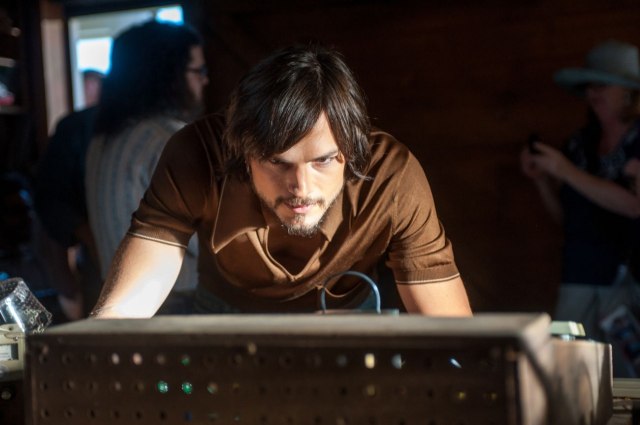By Armond White
“You are creating from Steve Jobs a Moses, a Jesus, a Mohammad,” Mohsen Makhmalbaf cautioned his atheist, technology-worshipping son in The Gardener. The worship continues in the movie Jobs, a drab biography of the Apple Computer magnate who is popularly praised for “changing the way we live.” Director Joshua Michael Stern lacks the skill for hagiography–the slick presentation of egotism that fooled many people in The Social Network, making a cultural hero out of Mark Zuckerberg. But by being the opposite of slick, Jobs gives the banal impression of reverence. It’s in the millennial mode of celebrity worship that passes for a bio-pic.
 Half a kudo to first time screenwriter Matt Whiteley for bluntly presenting Jobs’ unsavory incompatible personality–abrasive to co-workers, malicious to women who attempt to get close, dishonest with friends. Jobs admits ‘“I just can’t work for other people, I need my independence,” which the film appreciates unironically as a quality. Stern and Whiteley don’t know what to do with Jobs’ ornery personality, and aside from stoner detachment and a loping forward lurch, Ashton Kutchner cannot show it.
Half a kudo to first time screenwriter Matt Whiteley for bluntly presenting Jobs’ unsavory incompatible personality–abrasive to co-workers, malicious to women who attempt to get close, dishonest with friends. Jobs admits ‘“I just can’t work for other people, I need my independence,” which the film appreciates unironically as a quality. Stern and Whiteley don’t know what to do with Jobs’ ornery personality, and aside from stoner detachment and a loping forward lurch, Ashton Kutchner cannot show it.
Stern and Whiteley neglect the Eureka moments of inspiration in old-fashioned Hollywood bio-pics about artists, inventors and songwriters that at least explained a genius’ work. An early boss tells Jobs, “You’re damn good but you’re an asshole” and though the assessment is refreshing, a viewer never sees what makes Jobs “damn good.” Tech-geek Steve Wozniak (played by Joshua Gad) does actual construction and cogitation, we only ever see Jobs giving pitches that make him rich or garners standing ovations from everyone in his presence. “Jesus!” exclaims a surprised employee. “No, just Steve” says Jobs. Not modest, just rash.
Maybe the title Jobs is the cleverest thing about this plodding film since it ridicules what’s scarce in this economy with the example of a man known to fire people at will and yet become a gazillionaire. Throughout sketchy corporate warfare with fluffy-hair suits (Matthew Modine, Dermot Mulroney), Jobs blurts ad slogans about “ideas, heart, rebels, push the human race forward.” The film’s dubious assumption is that Jobs’ didn’t care about money: “Sorry, Gil. It’s not personal” says the cutthroat neo-hippie, coincidentally quoting The Godfather.
Instead of innovating, Jobs’ “genius” seems to be salesmanship: “It needs to be something people see and say ‘Man, I just have to have that!’” He’s like a film producer or network C.E.O. with a fantastically successful, timely angle: “This thing is for the everyman. We’ve got to make this thing simple, an appliance,” Jobs says. It doesn’t matter exactly what he’s selling; the filmmakers are too infatuated to show chagrin like the great “auto-mobiles have come” speech in The Magnificent Ambersons. Jobs is the bio-pic as shareholder’s report, turning audiences into worshipful consumers.
Follow Armond White on Twitter at 3xchair
